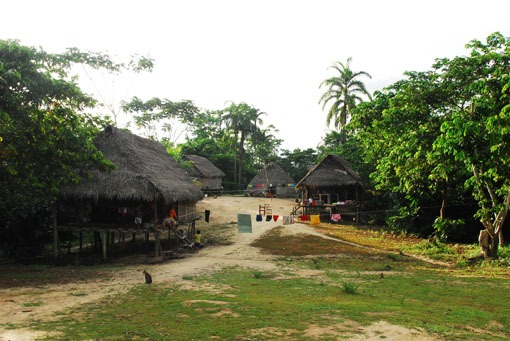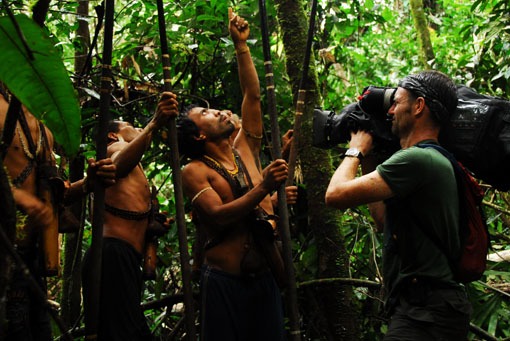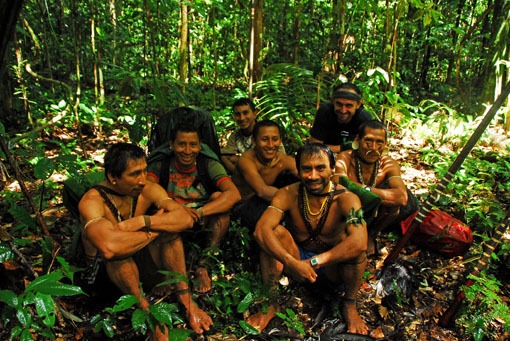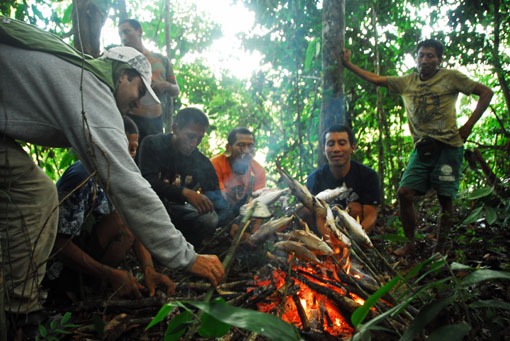This post courtesy BBC Earth. For more wildlife news, find BBC Earth on Facebook and Posterous.
“Is it all going to be like this?” Human Planet’s Assistant Producer Willow Murton takes us into the thick of the rainforest and shares what it’s really like to be confronted by deadly poisoned darts, a broken down boat, and fortune in disguise.
Masters of the Jungle
by Willow Murton, Assistant Producer, Oceans and Jungles team

There are places that you imagine you may return to and people you may meet again and then there are farewells to people and places you assume you will hold as a treasured memories. For me Aurelio village was one of those places; so remote, so distant, one of only two communities where the Matis of Brazil live. Set in the vast indigenous Vale do Javari reserve, it takes several days’ boat ride to reach the village, as well as many months of painstaking preparation. I had first come here to make the series Tribe and couldn’t believe my luck when I was asked to make a return trip for Human Planet–a rare privilege.

There is good reason to return to this remote corner of the Amazon for Human Planet‘s “Jungles” episode. The Matis are true masters of the rainforest. Pete, our endurance fit cameraman, and I are reminded of this on our first filming day. An hour into the hunt we’d come to film, we are up to our knees, even thighs at times in swamp mud, soaked through by the unrelenting rain and all eyes on deadly poisoned darts being fired over our heads! Pete turns to me and asks if it’s all going to be like this?

Luckily it isn’t. Thank goodness, our second hunt is on firmer, drier ground. We follow the hunters into their world, immersed in the sounds and signs of the forest as we track monkeys in the canopy. For all the planning, there are still situations that happen which are unimaginable and that can never be relived. After many hours hunting with no success, we are about to give up when suddenly a troop of monkeys scatters across the trees. The hunters follow, taking aim in the tree tops. The camera’s eye is no match for the trained focus of the hunters. They find their mark fast and before long, they are tying dead monkeys together to carry them back through the jungle. Exhilarated by the speed and skill of our forest guides, we head back to camp just as the rain starts to fall.
Part of our return journey is by boat. There we sit, the two of us, blowpipes and cameras balanced on benches, monkeys at our feet and a group of hunters devouring the last of the snacks that we brought. Survival in the jungle is about taking the opportunities that it offers–and a camera crew’s rations are as fair game as anything else found in the canopy. Pete turns to me, waving the sandflies from his eyes, and he utters the words no traveller should speak: “Imagine if we got stuck here now”.

At that moment the boats motor clunks and we are indeed stuck–the hungry hunters and us up an Amazonian creek with no paddle! The boatmen, calm as ever, are quick in their evaluation of the situation. The motor is beyond repair but we are not beyond help. Bushe, the Matis translator who I also worked with four years ago, turns to me and instructs me to use the satellite phone to contact the village to arrange a rescue. It will be long soggy bug filled few hours before anyone can reach us. We ask Bushe what they would do without the BBC’s technological intervention. “The forest has everything that the Matis need,” he replies and every Matis knows the paths that winds through the forest to the village.

We cover ourselves in insect repellent and lie back on the roof of the boat in beautiful resignation to the sunset and our eventual rescue. What passes in the next few hours is one of those gifts of disguised fortune–stolen time and experiences. Floating across the river, the boatmen set nets and within minutes, they have gathered a dozen fish for supper including piranha. Soon, we are back on the bank, in front of a bright fire, stabbed with sticks of fresh fish. We joke around the flames, laughing into the smoke. The fish is quickly eaten with the bizarre addition of fruit flavoured rehydration salts for those who prefer their piranha on the tropical tasting side.

Then we all wash in the river, as our socks dry on sticks over the embers. Laughing still, we clamber back onto our boat. The sunset darkens to a thick sky studded with stars and the sounds of the forest once more. Somewhere in the distance, a motor can be heard but for the moment, the jungle absorbs us entirely. It is so good to be back amongst my Matis friends.
















